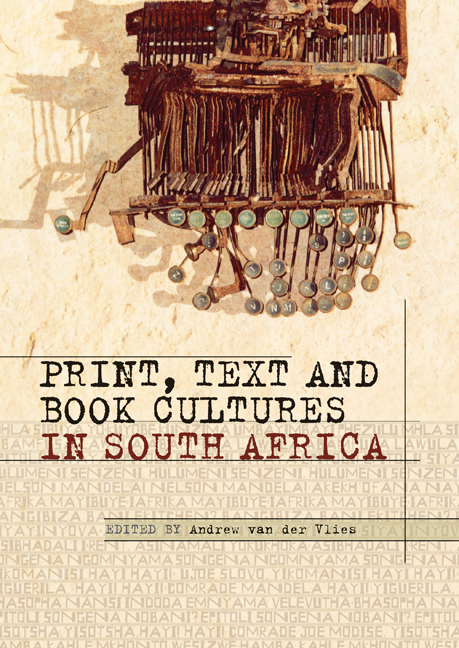Book contents
- Frontmatter
- Contents
- Acknowledgements
- Abbreviations and acronyms
- 1 Introductory
- 2 Print Cultures and Colonial Public Spheres
- 3 Local/Global: South African Writing and Global Imaginaries
- 3.1 Deneys Reitz and Imperial Co-option
- 3.2 “Consequential Changes”: Daphne Rooke's Mittee in America and South Africa
- 3.3 Oprah's Paton, or South Africa and the Globalisation of Suffering
- 4 Three Ways of Looking at Coetzee
- 5 Questions of the Archive and the Uses of Books
- 6 Orature, Image, Text
- 7 Ideological Exigencies and the Fates of Books
- 8 New Directions
- Contributors
- Index
3.2 “Consequential Changes”: Daphne Rooke's Mittee in America and South Africa
from 3 - Local/Global: South African Writing and Global Imaginaries
Published online by Cambridge University Press: 21 April 2018
- Frontmatter
- Contents
- Acknowledgements
- Abbreviations and acronyms
- 1 Introductory
- 2 Print Cultures and Colonial Public Spheres
- 3 Local/Global: South African Writing and Global Imaginaries
- 3.1 Deneys Reitz and Imperial Co-option
- 3.2 “Consequential Changes”: Daphne Rooke's Mittee in America and South Africa
- 3.3 Oprah's Paton, or South Africa and the Globalisation of Suffering
- 4 Three Ways of Looking at Coetzee
- 5 Questions of the Archive and the Uses of Books
- 6 Orature, Image, Text
- 7 Ideological Exigencies and the Fates of Books
- 8 New Directions
- Contributors
- Index
Summary
In the 1950s Daphne Rooke was the most popular South African writer in America. This was largely as a result of the triumph of her second and most successful novel, Mittee, which was widely reviewed throughout the United States, where it became a bestseller. In February 1952 Time magazine noted the comparability of Rooke's themes with those of American writers: “The US South used to be the main source of the world's supply of fiction plots about the clash of white and Negro; in the last dozen years, South African writers have moved into the market. The latest is Transvaal born Daphne Rooke” (Anon. 1952a). The New York Herald Tribune Book Review in May 1952 listed Mittee in its top 15 bestsellers and a Cleveland reviewer that year compared her “heady novels of romance and suspense” with those of Daphne du Maurier (Anon. 1952b; O'Neill 1952). In the country of her birth, South Africa, however, Rooke's reception was not as enthusiastic. In a review for the Cape Times, Jack Cope (1952) opined:
We hear complimentary opinions from abroad that there is a flowering in South African writing. If so, Daphne Rooke adds nothing significant. She uses unconvincing stock figures of the lecherous Boer hungering after Coloured women, or the mean tannie; violence and treachery with little motivation. But if a best seller requires a liberal seasoning of assaults, rape, murder and sexual intercourse, there is no complaint against Mittee.
Ian Glenn (1987, 3) notes that early South African reviewers were generally “condescending and inaccurate”, and although an edition of Mittee published by Victor Gollancz in London circulated in South Africa from 1951, as J. M. Coetzee (1991, 205) observes, it was only in the late 1980s, when a South African edition of Mittee was published, that readers began to give credit to Rooke in her native land. While an interesting phenomenon in its own right, this discrepancy in reception is not my focus here. Rather, I would like to examine an inconsistency between two editions of Mittee—the edition that first circulated in America (Rooke 1952) and the edition that first circulated in South Africa (Rooke 1951b)—a difference that has not been examined in previously published criticism.
- Type
- Chapter
- Information
- Print, Text and Book Cultures in South Africa , pp. 121 - 139Publisher: Wits University PressPrint publication year: 2012



